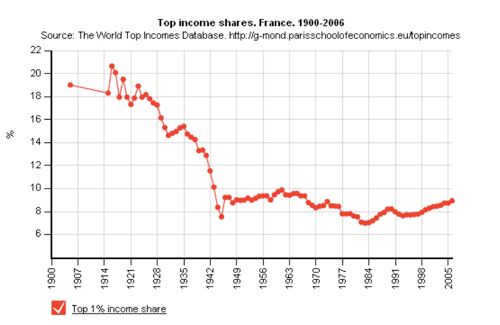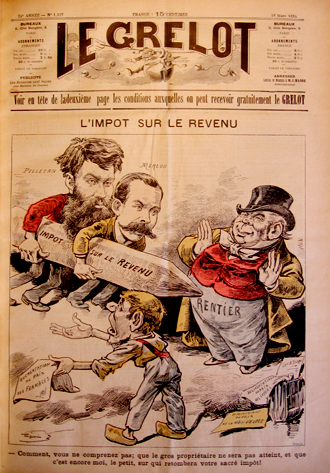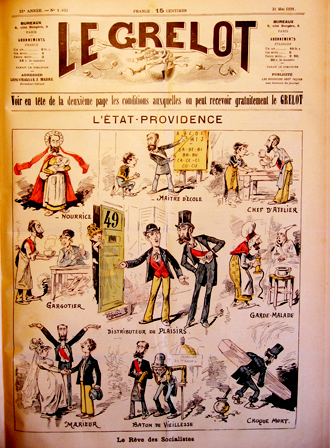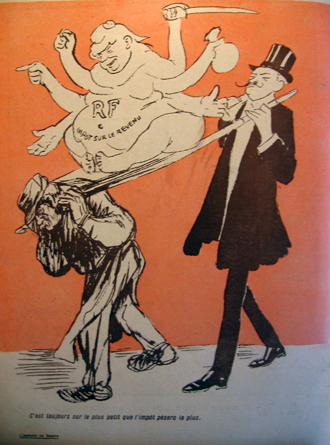
In his much-discussed major book, published just this year (Les Batailles de l’impôt. Consentement et résistances de 1789 à nos jours), Nicolas Delalande reconsiders the question of whether political democracy and universal suffrage must necessarily lead to State intervention in favor of a greater equality of conditions as he reexamines this still-current debate, which first took form in the late nineteenth century, back when the French Third Republic and democratic institutions were becoming established within the context of the “first phase of globalization.” His paper allows us to grasp better the extent to which the discussion today is rooted in a long-term history of different diagnoses and differing ambitions for society. Delalande also raises the issue of the representational image that is given of society as well as that of the employment of the tools that, starting during that period, would serve to put society into figures and to map it. Finally, he reminds us of the major role caricature plays in the fierce debates surrounding taxation.
Laurence Bertrand Dorléac
The Belle Époque of Inequalities:
The State, Taxes, and the Fear of Socialism
Nicolas Delalande
Must political democracy and universal suffrage lead to state intervention in favor of a greater equality of conditions? This debate, still of topical interest, was begun in the late nineteenth century as the French Third Republic and democratic institutions started to take root within the context of “first phase of globalization.” French republicans had long promoted the idea that the State was to allow a reduction in inequalities between rich and poor through the adoption of redistributive (fiscal and social) measures, the regulation of labor law, and the growth of public services available to all[ref]Gareth Stedman Jones, An End to Poverty? A Historical Debate (London: Profile Books, 2004). [/ref]. As early as the time of the French Revolution, progressive taxation was designed as one potential instrument for a “leveling of conditions” that would make a form of social cohesion possible beyond market-generated inequalities. Yet, up until the late nineteenth century, that objective remained highly controversial: as attached to republican institutions as they were, the Liberals feared that the progressive tax (on incomes or estates) would lead to the despoilment of the rich and, thereby, to denial of respect for private property ownership, a principle that was, according to them, indissociable from the legacy of the Revolution. The defenders of redistribution were said to be playing, without knowing it, into hands of “socialism” and acting against the Republic, thus imperiling a social and political edifice that was as fragile and it was prone to overthrow[ref]For a more developed presentation, see Nicolas Delalande, Les Batailles de l’impôt. Consentement et résistances de 1789 à nos jours (Paris: Éditions du Seuil, 2011).[/ref].
This controversy around the legitimacy of state intervention designed to promote economic and social equality among citizens hardened in the 1880s and 1890s. The Liberals and Conservatives, on the one hand, the Radicals and the Socialists, on the other, shared neither the same diagnosis nor the same ambitions. The former two groups reckoned that French society, underpinned by economic laws, was experiencing a near-natural evolution toward the equalization of conditions. The effort to educate the masses supposedly sufficed to promote social mobility and break up the hierarchies and privileges tied to birth and background. Economic equality was consequently said to be a nontopic, a social and media construction betraying ignorance of the statistical realities and inmost depths of French society. The latter two groups, on the other hand, thought that France would never be fully republican so long as the promise of social equality, sketched out during the French Revolution, had not been fulfilled. The democratization of institutions should go hand in hand with the democratization of the structures of French society. The movement toward equality results not from a natural process but instead from collective action, which has to take into account the wishes expressed through universal suffrage and to place the pursuit of the general interest above the defense of private interests. Through taxation, laws, and public investments, the State is the guarantor for the march toward equality[ref]Jean-Fabien Spitz, Le Moment républicain en France (Paris, Gallimard, 2005).[/ref].
At the heart of this political confrontation is situated an issue about knowledge and representation: What does one truly know about French society, its hierarchies and its inequalities? How is one to make society visible, so as to justify this or that policy? Though technical, the tax debate is fundamentally a debate about the definition of legitimate and appropriate representations of social stratification. In the late nineteenth century, economists, statisticians, commentators, social reformers, and political leaders endeavored to explore society through investigation and observation, the construction of detailed facts and figures, cartographic representation, and so on.[ref]Christian Topalov, ed., Laboratoires du nouveau siècle. La nébuleuse réformatrice et ses réseaux en France, 1880-1914 (Paris: Éditions de l’École des Hautes Études en Sciences Sociales, 1999). [/ref] Before settling the question of the legitimacy of state intervention philosophically and politically, one still has to know what the society looks like that one is aspiring to transform or to leave unchanged.
Is There a Tendency Toward the Equalization of Conditions?
The debate about social inequalities deeply divided late nineteenth-century economists and social reformers. In a work published in 1881 on the basis of his initial lectures at the Collège de France, the most famous spokesperson for the Liberal school of thought, Paul Leroy-Beaulieu, deemed that inequalities were tending to diminish and that the market was leading inevitably toward the equalization of conditions. It was, on the other hand, the public powers that were said to be, through their interventions and interferences, responsible for the maintenance and even the reinforcement of inequalities in status and conditions. Memory of the Ancien Régime obviously weighed heavily on this view, which attributed the consolidation of inequalities to the pernicious role of regulation.
From all that precedes, it results that what is called the social question resolves itself on its own, inasmuch, at least, as it is resolvable, little by little, bit by bit, with the mere contribution of time, capital, education, liberty, philanthropy, charity, too, which many economists treat too severely and which we do not dismiss. . . . The State no doubt has a role to play, duties to fulfill. But this role is not as predominant as one would like you to believe, nor are these duties so far-ranging. As concerns an approximation toward a lesser inequality of conditions, laws have rather a negative than a positive effect.[ref]Paul Leroy-Beaulieu, Essai sur la répartition des richesses et sur la tendance à une moindre inégalité des conditions, 2nd ed. (1883), pp. 550-51. [/ref]
And yet, the figures Leroy-Beaulieu had at his disposal when conducting his study were limited in scope. The era’s statisticians (Georges d’Avenel, Alfred de Foville, Adolphe Turquan, and Léon Salefranque, for example)[ref]Alfred de Foville, La Richesse en France et à l’étranger (Paris: Berger-Levrault, 1893); Georges d’Avenel, La Fortune privée à travers sept siècles (Paris: Armand Colin, 1895); Victor Turquan, Évaluation de la fortune privée en France et à l’étranger dans ses rapports avec la fécondité des familles: étude économique et géographique de la répartition de la richesse (Paris: L. Larose, 1901); Léon Salefranque, La Fortune privée en France (Paris: Imprimerie nationale, 1901). [/ref] were rather lacking in resources for their effort to gauge inequalities of wealth and, still more so, to offer a representation of them. The Ministry of Finances did indeed publish two atlases of economic and financial statistics in the 1880s, but most of the data bore on the territorial share of incomes, département by département, and not on their social distribution[ref]Atlas de statistique financière, par la direction du Contentieux, de l’inspection générale de l’Ordonnancement et de la Statistique (Paris: Imprimerie nationale, 1881; new ed. in 1889).[/ref]. Likewise, inequalities in holdings remained relatively obscure, especially if one considers that statistics relating to estates did not genuinely improve until the introduction of progressiveness in estate laws in 1901. For Leroy-Beaulieu, the sense that there was an explosion of inequalities, as expressed by the Socialists and certain commentators, was an optical illusion unconfirmed by any figures. Calm, careful, and patient study of the available data, as limited as they were, would allow one to wring the neck of commonsense perceptions, blinded as they were thought to be by the existence of some very concentrated pockets of wealth and poverty that gave a distorted perception of the general level of well-being in society. The defenders of the thesis that inequalities were increasing were said to be allowing themselves to be deceived by their senses and their prejudices:
The crowd and all unreflective minds suppose that wealth distribution is occurring in an increasingly unequal way. Jealousy, envy, and also feelings of admiration are comforted by ridiculous exaggerations about the number and the size of great fortunes. . . . I have always been astonished, and at the same time saddened, by this sort of idle curiosity that wholly alters the face of society. Many detailed reflections, the examination of all informative documents, the study of all indices, and the knowledge, too, of many particular cases have demonstrated to me that great fortunes are everywhere infinitely rarer than one supposes, that they represent in income a minuscule portion of the national revenue, and that middle-sized fortunes themselves are neither as frequent nor individually as large as one supposes.[ref]Paul Leroy-Beaulieu, Essai sur la répartition des richesses, p. 493.[/ref]
The more or less egalitarian nature of French society was a topic of debate in the late nineteenth and early twentieth centuries. The image of a society of small property owners, stemming from the French Revolution, informed an entire section of political discourses opposed to state intervention, which was said to be shown to be redundant or counterproductive[ref]According to an argument well highlighted by Albert O. Hirschman in The Rhetoric of Reaction: Perversity, Futility, Jeopardy (Cambridge, MA: Belknap Press, 1991).[/ref]. France, it was said, did not need to adopt a redistributive form of taxation, given its low level of inequalities, particularly as compared to much more aristocratic societies like Great Britain, Germany, and Russia[ref]For an essay in comparative social history that allows one to go beyond stereotypical nationalist views, see Christophe Charle, La Crise des sociétés impériales. Allemagne, France, Grande-Bretagne (Paris: Éditions du Seuil, 2001).[/ref]. While comparison with other countries could work in favor of the thesis of a lesser inequality of conditions in the France of the Belle Époque, investigations conducted a century later by economists and historians show, however, that inequality in holdings was then reaching its heights. The late nineteenth-century society of rentiers harbored some forms of inequality that have remained without any equivalent in the twentieth century.[ref]Thomas Piketty, Gilles Postel-Vinay, and Jean-Laurent Rosenthal, “Wealth Concentration in a Developing Economy: Paris and France, 1807-1994,” American Economic Review, 96:1 (2006): 236-56.[/ref] A posteriori, the image of an egalitarian society really seems to have been more a myth, indeed a useful one on the political level, than a description fitting the reality of the social structure. The scientific knowledge Leroy-Beaulieu prided himself on possessing was largely due to the economic and social prejudices of the author himself, as the economist Thomas Piketty has underscored.[ref]Thomas Piketty, Les Hauts Revenus en France. Inégalités et redistribution, 1901-1998 (Paris: Grasset, 2001).[/ref] The paradox is that it was in fact almost impossible to measure with precision the distribution of incomes and fortunes in the absence of a tax collected via declared returns (which certainly existed for estates, but not for taxes on income before World War I). Tax statistics are the basis for recent works on the history of inequality: the progressive tax is the instrument that has allowed one both to give objective form to economic inequalities, by measuring them, and to correct them.

Graphique 1
Part du revenu des 1% les plus riches dans l’ensemble des revenus en France, 1900-2006
The Fear of Social Egalitarism
The various forms of resistance to state intervention are to be explained by the fear on the part of elites that they might see themselves dispossessed of their political power and their moral authority. Although it would no longer really be possible, in the late nineteenth century, to denounce the very principle of universal male suffrage, there were many people who worried about its consequences as regards economic and social policy: the masses, uneducated on the level of economic ideas, were said to be susceptible to demagogic discourses that called for the redistribution of wealth and the proliferation of electioneering-based spending. Liberal economists, in particular, viewed with dread the progress of interventionist ideas in the 1880s and 1890s (regarding customs, fiscal, and social policy), which they imputed to the excesses of universal suffrage. Every measure favoring or legitimating state intervention was then reputed to be opening the way to socialism, such measures being inspired by a concern for a leveling of conditions and for social revenge. The progressive tax on income and estates, defended by Socialists as well as by moderate Radicals, and by certain economists who were convinced of its utility for public finances, was said to herald a war of the poor against the rich that, in the name of egalitarianism, would imperil respect for individual rights and liberty. The crowd, blinded by its prejudices, was said to be ready to sacrifice the country’s elite on account of mere resentment, as an adversary of the income tax stated in 1914:
The various forms of resistance to state intervention are to be explained by the fear on the part of elites that they might see themselves dispossessed of their political power and their moral authority. Although it would no longer really be possible, in the late nineteenth century, to denounce the very principle of universal male suffrage, there were many people who worried about its consequences as regards economic and social policy: the masses, uneducated on the level of economic ideas, were said to be susceptible to demagogic discourses that called for the redistribution of wealth and the proliferation of electioneering-based spending. Liberal economists, in particular, viewed with dread the progress of interventionist ideas in the 1880s and 1890s (regarding customs, fiscal, and social policy), which they imputed to the excesses of universal suffrage. Every measure favoring or legitimating state intervention was then reputed to be opening the way to socialism, such measures being inspired by a concern for a leveling of conditions and for social revenge. The progressive tax on income and estates, defended by Socialists as well as by moderate Radicals, and by certain economists who were convinced of its utility for public finances, was said to herald a war of the poor against the rich that, in the name of egalitarianism, would imperil respect for individual rights and liberty. The crowd, blinded by its prejudices, was said to be ready to sacrifice the country’s elite on account of mere resentment, as an adversary of the income tax stated in 1914:
Why make war on the rich? Why attack wealth when, in short, each of us, each human being, is pursuing it to the best of his strengths, intelligence, and abilities—and ceases to attack it as soon as he attains it? . . . Acquiring affluence or fortune through his work, his intelligence, or his spirit of thrift, becoming rich through his personal effort or thanks to that of his parents is not a privilege but a right.[ref]Léon Sentupéry, Nos impôts et les principes républicains (Paris: Société des publications industrielles, 1914), p. 40-43.[/ref].

The Income Tax as Seen by Pépin in Le Grelot, March 18, 1894
In the 1890s, the term socialist became an insult launched by the Liberals against all those who dared to declare themselves in favor of even limited state intervention in the economic and social spheres. During a debate organized by the French Society of Political Economics in 1895 on “the advantages and disadvantages of the inequality of conditions,” almost all the speakers (Frédéric Passy, Paul Leroy-Beaulieu, Alfred Neymarck, Gustave de Molinari) were in agreement in thinking that the State ought to abstain from any effort to correct it. Only one of the participants, the sociologist René Worms, deemed that it would be preferable that the public powers intervene to attenuate inequalities based on birth or chance by means, for example of a progressive tax on estates. The boldness of his position obliged him to reject being described as a “socialist,” a term some of the other participants used to reproach him. Because he was in favor of a limited progressive tax on estates, Worms seemed guilty of supporting the Socialists in their plan to confiscate fortunes. During a new session devoted to “the struggle against socialism” in April 1896, he again found himself alone when he deemed that the French Society of Political Economics did not need to transform himself into a “combat group” and that it should remain a place for study and scholarly debate. On the contrary, Anatole Leroy-Beaulieu (the brother of the economist) and Yves Guyot deemed that there was an urgent need to defend Liberalism and economic competition against the new collectivist doctrines: if there were to be a fight, it’s the fault of socialism, which has gone to war against the sacred principles of “economic science.”[ref]April 1896 session of the French Society of Political Economics, “De la lutte contre le socialisme,” Journal des économistes, April 1896: 102-12.[/ref].
During the income tax debate, between 1907 and 1914, its adversaries not only contested the idea that there might be a problem of inequalities in French society but also thought that the introduction of this type of taxation would undermine the prospects of social mobility, thus going against the declared objectives. Taxing the rich would boil down to discouraging all efforts on the part of individuals desirous of rising within the social hierarchy. The opponents of the income tax, who denounced the bill presented by Joseph Caillaux in 1907 (and finally passed in 1914), did so by taking shelter behind a defense of the “middle classes” (an Association for the Defense of the Middle Classes was indeed created in 1908).[ref]Jean Ruhlmann, Ni bourgeois ni prolétaires. La défense des classes moyennes en France au XXe siècle (Paris: Éditions du Seuil, 2001).[/ref]. The consequence of the introduction of energetic redistributive measures, it was said, would be to restrain the motor of social advancement, which was supposed to serve as the cement for the intermediary groups situated between the popular classes and the bourgeoisie that aspired to property ownership and independence:
Each day in our shops and in our workrooms, from a workman the day before, we make a bourgeois, for we are a class broadly open to labor and not a prideful and closed caste. Individual property ownership does not separate us from the proletariat; it unites us with the latter.[ref]Maurice Colrat, speech delivered to the Association de défense des classes moyennes (Association for the Defense of the Middle Classes), December 3, 1908, reprinted in Les Études fiscales et sociales, 9 (December 15, 1908): 66.[/ref]
Tax Equality
It was within this context that one is to understand the intensity of the debates over the legitimacy of state intervention in the effort to reduce inequalities, particularly via taxation. Different conceptions of equality clashed on this occasion. The adversaries of the income tax denounced it on the grounds that the equality being pursued would not be that of a rebalancing among social groups but a leveling down, a decline unfavorable to all. By bringing to the fore the fear of a “fiscal inquisition,” an argument that was omnipresent in the early twentieth century, they deemed that the income tax would place all taxpayers, whatever their incomes, in one and the same situation of vulnerability opposite the State. Differences in wealth would be of little weight compared to the shared fate of individuals hunted down and “ground up” by the investigative powers of the tax department. This critique met up with the one, already present at the time, of the “Welfare State,” the public authorities substituting for the Church in the supervision and enrolment of individuals, from the cradle to the grave. In the name of egalitarianism, the majority were said to be ready to sacrifice their liberty, a criticism that is obviously not unreminiscent of the Tocquevillean warning from the 1830s.

The Welfare State, “The Socialist’s Dream”, as Seen by Le Grelot, May 31, 1891
In a classic way, some rejected the income tax on the grounds that it was said to be inspired by an illusory promise of equality among citizens: its objective of an equalization of conditions was said to stumble over inequality among taxpayers as regards the severity of the tax legislation. In other words, however progressive it might be, taxation can reduce the inequalities of wealth only if each is subjected to it on an equal footing. The Right at the time accused Finance Minister Caillaux of claiming to tax the rich in order to better make the “middle classes” pay up, the former having numerous means at their disposal to conceal their fortunes, in particular abroad. A part of the Left, the anticapitalist part, was not far from sharing the same opinion: for some of them, who were skeptical as to the republican State’s ability to curb the capitalist system, the income tax was said to increase the burden of proletarians, the bourgeois State endowing itself here with a new tool of oppression against the weak. Conceived in this way, tax equality was said to be a pipe dream. It would hence have been better to abolish all taxes, as the nineteenth-century Anarchists proposed, rather than countenance a tool that in appearance was democratic but in practice was tough on the weak.

The Income Tax as Seen by Jules Granjouan in L’Assiette au beurre, May 4, 1907
It was at the turn of the twentieth century that an intellectual and political watershed occurred in the way one thought of the State’s role in the reduction of social inequalities. Among a whole set of measures, recourse to taxation was one of the means envisioned for correcting the injustices of the market and for promoting a better distribution of incomes and holdings. This great debate, which extended over several decades, rested on a confrontation between contradictory visions of equality. Beyond its technical and statistical aspects, the controversy around the income tax raises a basic question, that of the representation of social stratifications and the legitimacy or illegitimacy of the State’s intervening in order to try to modify them. Yesterday as today, debating about taxes is the occasion for a confrontation between several visions of what society is and ought to be. The divergences often are revealed to be major between the subjective perception of inequalities and the data produced by tools designed to objectivize those inequalities. Yet it is still the “passion for equality,” whether denounced or championed, that is to be found at the heart of this democratic confrontation over the missions of taxation and its being put into service in order to fulfil a societal project.
Selected Bibliography
BLAIS, Marie-Claude. La Solidarité. Histoire d’une idée. Paris: Gallimard, coll. “Bibliothèque des idées”, 2007.
CHARLE, Christophe. La Crise des sociétés impériales. Allemagne, Angleterre, France. Paris: Éditions du Seuil, 2001.
DELALANDE, Nicolas. Les Batailles de l’impôt. Consentement et résistances de 1789 à nos jours. Paris: Éditions du Seuil, 2011.
HORNE, Janet. Le Musée social. Aux origines de l’État-providence. Paris: Belin, 2004.
PIKETTY, Thomas. Les Hauts Revenus en France au XXe siècle. Inégalités et redistribution, 1901-1998. Paris: Grasset, 2001.
ROSANVALLON, Pierre. La Société des égaux, Paris: Éditions du Seuil, 2011.
RUHLMANN, Jean. Ni bourgeois ni prolétaires. La défense des classes moyennes en France au XXe siècle. Paris: Éditions du Seuil, 2001.
SPITZ, Jean-Fabien. Le Moment républicain en France. Paris: Gallimard, 2005.
TOPALOV, Christian. Ed. Laboratoires du nouveau siècle. La nébuleuse réformatrice et ses réseaux en France, 1880-1914. Paris: Éditions de l’École des Hautes Études en Sciences Sociales, 1999.
Nicolas Delalande , who has a teaching certificate and a doctorate in contemporary history, is a researcher at the Centre d’histoire at Sciences Po. His works bear on the social and political history of the State, the history of tax resistance, and the circulation of economic and social-scientific knowledge in the nineteenth and twentieth centuries. He has recently published, along with Alexis Spire, Histoire sociale de l’impôt (Paris: La Découverte, 2010) and Les Batailles de l’impôt. Consentement et résistances de 1789 à nos jours (Paris: Éditions du Seuil, 2011). He is now interested in the historical construction of state credit and the ways in which it has been contested.
